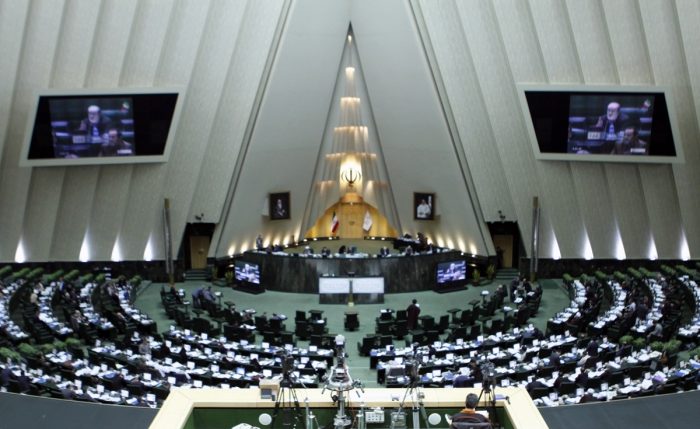
Iranian regime’s parliament building in Tehran
Last week the Iranian regime’s legal and judicial parliamentary commission finalized a draft amendment that would make it legal to deny detainees charged with certain crimes access to legal representation while their cases are being investigated. The amendment to the Code of Criminal Procedure will be voted on in the regime’s Majlis (parliament) in the near future.
#Iran Regime Denying Prisoners' Rights in Violation of International Laws https://t.co/UOS4MHlNaA
— NCRI-FAC (@iran_policy) May 18, 2019
The amendment denies attorneys to those charged with “national security” offenses, a term that encompasses a variety of activities the regime perceived as a threat to its rule. Political dissidents, journalists, human rights activists, and lawyers are among those who are often charged with national security crimes. MEK supporters are often charged with national security offenses for peaceful resistance activities.
The amendment would effectively deny these detainees the right to counsel, adding to the list of grave human rights violations perpetrated by the clerical regime.
Amnesty International’s Response
Amnesty International stated that the “regressive piece of draft legislation,” if passed, would put Iran in violation of its obligations under international law because it would legally deny defendants the right to a lawyer in a number of different criminal investigations.
Amnesty International also expressed concern that passage of the bill would serve to justify the regime’s use of torture and abuse of detainees.
Press Release: A proposed draft bill on access to a lawyer in Iran will "effectively remove the right to a lawyer in a wide range of criminal investigations and contravene Iran’s obligations under international law."
Read our press release & analysishttps://t.co/zTl8pjTH7N pic.twitter.com/STIOqKUUl6
— Amnesty Iran (@AmnestyIran) May 16, 2019
Philip Luther, Amnesty International’s Research and Advocacy Director for the Middle East and North Africa, was grim in his assessment of the effects of the amendment. He said: “If passed by MPs it would be a crushing blow to Iran’s already deeply defective justice system and could further consolidate patterns of torture and other ill-treatment against detainees to extract forced confessions during interrogations.”
Luther added that the denial of legal counsel is particularly disturbing when the individual affected faces an irreversible punishment such as amputation or execution.
2015 Provision
The current amendment is the latest effort by the regime to deny its citizens basic rights while they are in custody. In 2015, Majlis passed a provision to the Code of Criminal Procedure, which forced detainees charged with certain crimes to choose their lawyers from a list approved by the judiciary chief. The regime has neglected to even allow detainees this limited right, and many prisoners have been denied any legal representation at all.
The regime has no problem ignoring its own laws, but by creating an amendment that openly flouts international law, it opens itself to scrutiny. The international community must hold the Iranian regime accountable for its human rights violations and demand that it comply with international law.
The denial of legal representation to political prisoners is yet another attempt by the repressive regime to prevent a widespread rebellion. These suppressive tactics have not worked in the past and have only served to remind the Iranian people of why it is so necessary to continue to fight for regime change. The mullahs fail to understand that the tactics that have caused the people to rise up will not work to suppress them. The only thing that will end the protests and unrest in the country is the end of the clerical regime.
Staff writer
